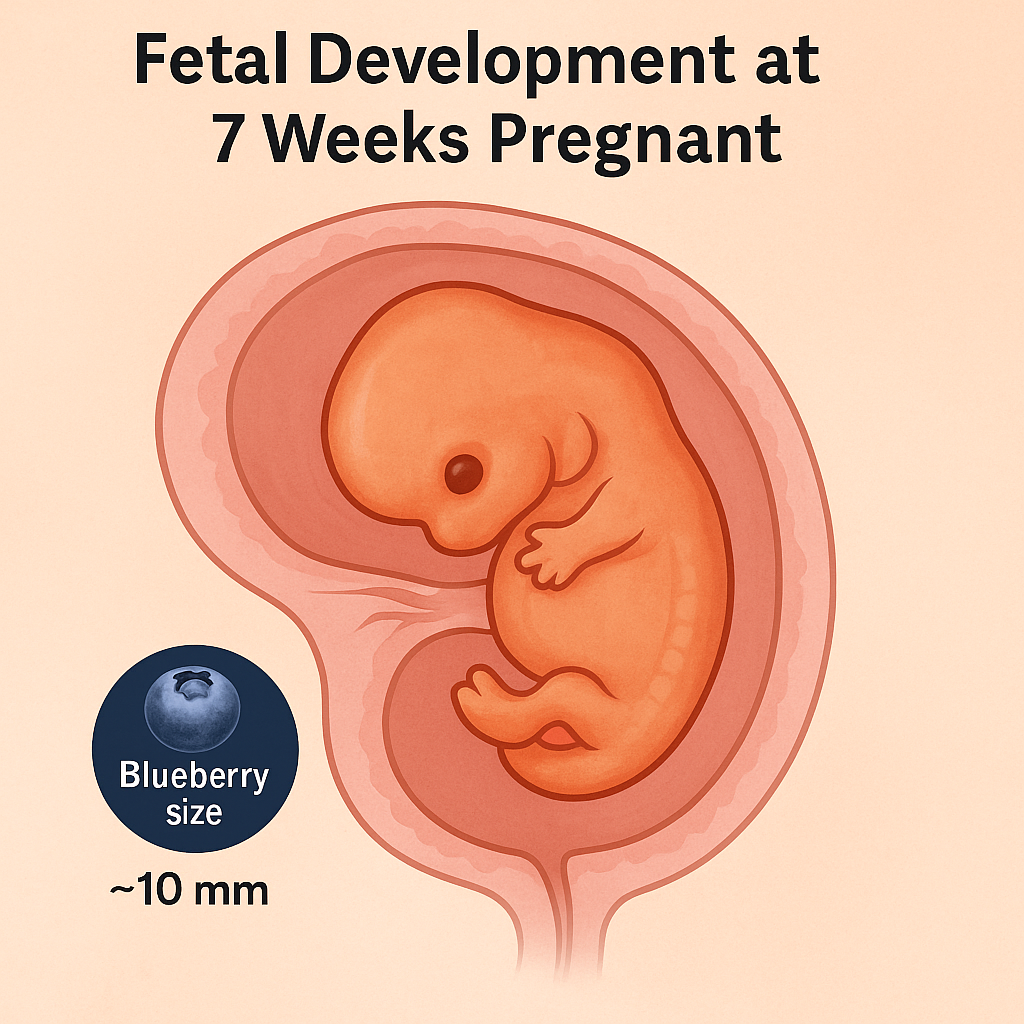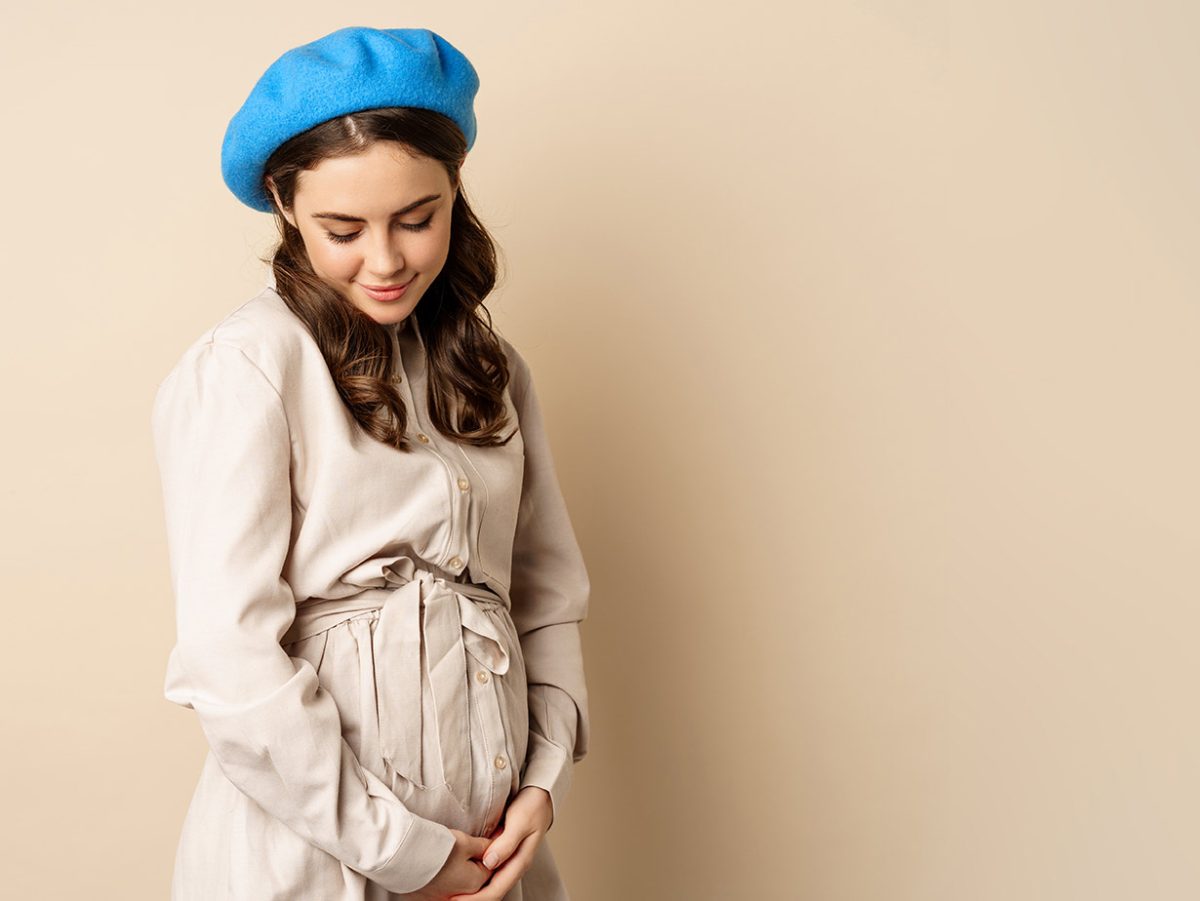Congratulations — you’re 7 weeks pregnant, and your baby is developing rapidly! Even if your bump isn’t showing yet, a lot is going on inside your body. This guide explores everything you need to know: common symptoms, what your belly might feel like, how your baby is developing, and tips for a healthy first trimester.
🔁 Missed last week? Read: 6 Weeks Pregnant: What to Expect, Cramping & First Ultrasound Guide
👶 Fetal Development at 7 Weeks Pregnant

At 7 weeks, your embryo is about the size of a blueberry—around 10 mm long. Despite its tiny size, massive developmental changes are underway.
What’s Happening This Week?
According to ACOG:
- Brain Development: The brain is growing at a fast pace, with the formation of the cerebral hemispheres.
- Limb Growth: Arms and legs are forming, and tiny paddles at the ends will soon become fingers and toes.
- Facial Features: Nostrils, mouth, and eye lenses are beginning to form.
- Heartbeat: Your baby’s heart is beating around 120–160 beats per minute, which may be detected via ultrasound.
This stage is critical, and proper prenatal care is essential to support the development of your baby’s organs and systems.
🤰 7 Weeks Pregnant Symptoms
Pregnancy symptoms often intensify at this point due to rising levels of hCG (human chorionic gonadotropin) and progesterone. Each pregnancy is unique, but here are the most common symptoms at 7 weeks:
🌿 Common 7 Weeks Pregnant Symptoms:
- Nausea and Vomiting (Morning Sickness)
A hallmark of early pregnancy, nausea can be triggered by smells, foods, or even hunger. Ginger tea and vitamin B6 supplements may help. - Fatigue
You may feel exhausted due to hormonal shifts and the body’s effort to support the embryo. - Breast Tenderness and Growth
Your breasts may feel heavier and sore as the body prepares for breastfeeding. - Frequent Urination
Hormones increase blood flow to the kidneys, and your uterus begins to press against the bladder. - Mild Cramping or Spotting
Some women experience light cramps or spotting. According to NHS, mild spotting is common, but always report heavy bleeding or severe pain. - Bloating and Gas
Progesterone relaxes muscles, including the digestive tract, leading to bloating. - Food Cravings or Aversions
You might start disliking foods you once loved or craving unusual combinations.
💬 Curious if cramping is normal? Learn more in our guide: Pregnancy Cramping: What’s Normal vs. When to Worry
🤰 7 Weeks Pregnant Belly: What to Expect
At 7 weeks, your belly likely hasn’t “popped” yet, especially if it’s your first pregnancy. However, bloating and uterine growth might make your pants feel tighter.
Belly Changes:
- Uterus Expansion: Your uterus has doubled in size since conception and is about the size of a lemon.
- Bloating vs. Baby Bump: Most of the belly growth at this stage is from gas, not the baby!
- Mild Stretching Sensations: You may feel pulling sensations in your lower abdomen — these are usually harmless.
When Will You Show?
According to Mayo Clinic, first-time moms usually start showing around 12–16 weeks, while second pregnancies may show earlier.
🍎 Nutrition & Health Tips at 7 Weeks Pregnant
🥗 Eat Small, Frequent Meals
This helps manage nausea and keeps your blood sugar stable. Focus on:
- Whole grains
- Lean proteins
- Fresh fruits and vegetables
- Prenatal vitamins with folic acid (400–800 mcg)
💧 Stay Hydrated
Drink at least 8–10 cups of water daily. Dehydration can worsen headaches, fatigue, and cramping.
🚶 Gentle Exercise
Light walking or prenatal yoga supports circulation, relieves stress, and helps digestion. Always consult your healthcare provider before starting a fitness routine.
🚫 Avoid Harmful Substances
- Alcohol
- Smoking
- Unpasteurized dairy
- Raw or undercooked meats
- High-mercury fish (e.g., shark, swordfish)
📌 Need a checklist? Check out: First Trimester Checklist: What You Should Do Now
🧘 Mental Health at 7 Weeks Pregnant
Mood swings, anxiety, and emotional sensitivity are common due to fluctuating hormones.
What You Can Do:
- Practice mindfulness or meditation
- Journaling can help express and release emotions
- Talk to your partner or a trusted friend
- If sadness or anxiety is persistent, consult your healthcare provider — early intervention is key
🧠 WHO emphasizes the importance of mental health during pregnancy in its maternal care guidelines. (source)
🩺 When to Call Your Doctor at 7 Weeks Pregnant
Seek medical attention if you experience:
- Heavy bleeding or severe cramping
- Fever above 38°C (100.4°F)
- Fainting or dizziness
- Pain on one side of the abdomen
- No pregnancy symptoms and history of miscarriage
Always trust your instincts—if something feels off, reach out to your healthcare provider.
FAQs About 7 Weeks Pregnant
Yes — light cramping is common as your uterus grows. But if cramps are severe or paired with bleeding, consult your doctor.
Usually not. What you may feel is bloating or mild stretching. Most first-time moms show between 12–16 weeks.
Avoid alcohol, raw fish, high-mercury fish, unpasteurized dairy, and undercooked meats to protect your baby’s health.
es, gentle activities like walking or prenatal yoga are generally safe. Always ask your doctor before starting any routine.
Your baby is about the size of a blueberry — around 10 mm long — and growing rapidly each day.
🔗 Related Articles
- 6 Weeks Pregnant: What to Expect, Cramping & First Ultrasound Guide
- 5 Weeks Pregnant: Symptoms, Baby Development & Early Signs
- Pregnancy Cramping: What’s Normal vs. When to Worry
- First Trimester Checklist: What You Should Do Now
📅 What to Expect in Week 8
Your baby will soon start to resemble a tiny human as fingers and toes develop! You might begin to feel more intense symptoms, and a first prenatal appointment may be scheduled.
👉 8 Weeks Pregnant – Symptoms, Ultrasound & What’s Happening
✍️ Final Thoughts on Being 7 Weeks Pregnant
At 7 weeks pregnant, your baby is developing rapidly, and your body is adjusting to support this growth. While symptoms like nausea, fatigue, and bloating can be uncomfortable, they’re all signs that things are progressing normally.
Take time to care for your body, nourish your mind, and stay informed with trusted resources. Whether you’re feeling excited, anxious, or somewhere in between—your experience is valid, and you’re not alone.

Leave a Comment